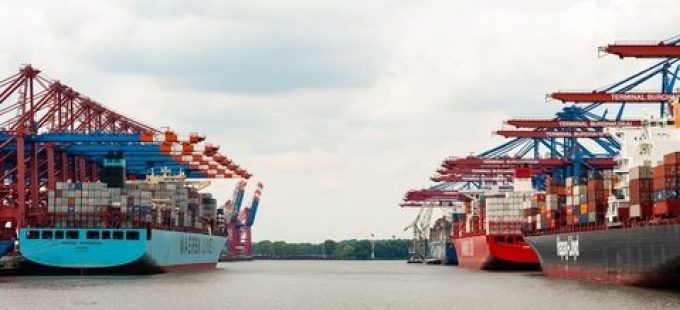Threat of rising oil price adds to frustration for crisis-hit supply chain chiefs
New warnings from the World Bank of surging oil prices, adding to the continuing instability ...

Ahead of the divorce from 2M Alliance partner MSC, Maersk has turned the head of THE Alliance lead line Hapag-Lloyd to form a new long-term operational collaboration.
The ‘Gemini Cooperation’ will start in February 2025.
The agreement represents a u-turn by Maersk, which had said its integrator strategy “did not fit” with vessel sharing, and will come as a shock to Hapag-Lloyd’s THEA partners, ONE, Yang Ming and HMM.
The break-up of the 2M was announced on 25 January last year, shortly after MSC passed Maersk to become the world’s largest container carrier, and will officially cease in January next year.
In the interim, the two lines have more or less split their east-west loops into services deploying either Maersk- or MSC-operated vessels. Additionally, they have added a number of standalone services into the mix, for instance MSC reinstating its China-North Europe Swan service in May last year without Maersk.
The new Gemini Cooperation between Maersk and Hapag-Lloyd will cover seven trades: Asia-US west coast; Asia-US east coast; Asia-Middle East; Asia-Mediterranean; Asia-North Europe; Middle East/India-Europe; and the transatlantic.
It will comprise 26 mainline services, supported by a network of dedicated shuttle services, centred around owned or controlled transhipment hubs and will deploy around 290 vessels, with a combined capacity of 3.4m teu, of which 60% will be supplied by Maersk and 40% by Hapag-Lloyd.
Today’s announcement has taken the industry by surprise, particularly as, according to MSC CEO Soren Toft, Maersk instigated the 2M split and said it was not interested in joining a new vessel-sharing agreement.
Indeed, Maersk’s CEO Vincent Clerc told analysts and investors on a number of occasions following the decision to dissolve the 2M that the carrier was not seeking to join or form another VSA. It appears Mr Clerc and his board have been persuaded to change their minds.
Now he says Hapag-Lloyd is “the ideal partner on our strategic journey” and would “raise the bar for reliability in the industry”.
As part of the deal, Maersk and Hapag-Lloyd have set a target of improving schedule reliability to above 90%, which would represent a dramatic improvement on the currently low 60% average in the liner industry.
In terms of decarbonisation targets, Maersk is aiming for net zero by 2040, while Hapag-Lloyd’s goal is 2045.
And in a separate message to customers, Hapag-Lloyd CEO Rolf Habben Jansen was keen to reassure the carrier’s forwarding clients that “we have no intention to become a logistics integrator”.
He said: “This does not represent a change of strategic direction for Hapag-Lloyd. We remain fully focused on liner shipping and the closely connected terminal and inland operations.”
He was also keen to praise the “long-standing, trusted and successful partnership” of THE Alliance, which Hapag-Lloyd will leave at the end of January 2025.
Mr Habben Jansen said the new VSA would pair its customer service with “much higher operational quality in a robust and resilient network”.
Vespucci Maritime’s Lars Jensen said the move by Hapag-Lloyd left the remaining THEA partners, ONE, Yang Ming and HMM, “in a very vulnerable position, unable to field a network matching those of the Ocean Alliance, MSC or Gemini”.
He added: “The pressure is then on these carriers to either lure a new partner from the Ocean Alliance, or re-invent a new service concept.”
And Drewry’s Simon Heaney agrees. He commented: “This leaves a large gap in THE Alliance offering… this will undoubtedly come as a surprise to them as the agreement was extended for 10 years when HMM joined in April 2020.”
Comment on this article
Frederik deCockBuning
January 17, 2024 at 3:03 pmA bold plan but somewhere it does not fit. there must be more behind this. watch this space !
Theodor Strauss
January 19, 2024 at 2:23 pmGlad to see that Frederik deCockBuning is still following the latest news in the liner business.